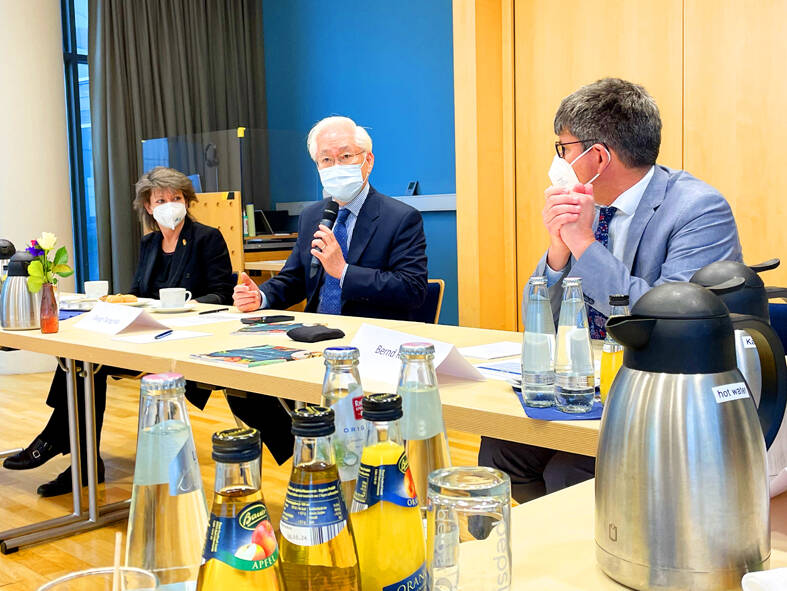Taiwan is seeking to deepen cooperation with Germany on energy transition and in the exploration of new techniques for reaching carbon neutrality, the National Science and Technology Council (NSTC) said in a statement yesterday.
NSTC Minister Wu Tsung-tsong (吳政忠), who arrived in Europe on Tuesday last week and is touring there until Friday, visited the Alexander von Humboldt Foundation, which was founded to promote international academic cooperation.
While there, he met with German scientist Robert Schlogl to discuss their countries’ energy transition experiences and the importance of reaching carbon neutrality, the NSTC said.

Photo courtesy of the National Science and Technology Council
Wu said that Taiwan is forging a path to achieve net zero emissions by 2050, while Schlogl said Germany expects to reach that goal by 2045, the council said, adding that the German scientist also spoke of the importance of developments in new hydrogen technologies.
Wu said Taiwan is seeking international cooperation in technologies related to decarbonization, and Schlogl expressed his willingness to forge cooperation exchanges in such fields with Taiwan, the council said.
From Jan. 1, Schlogl is to assume the role of president of the foundation. He is director of the Fritz Haber Institute (FHI), part of the Max Planck Society in Berlin, and of the Max Planck Institute for Chemical Energy Conversion in Mulheim an der Ruhr.
After the meeting, Schlogl arranged for Wu to visit the FHI, a renowned research center with ties to five Nobel Prize winners.
Wu also met German Minister of Education and Research Bettina Stark-Watzinger, the council said, although it did not provide details of the meeting.
On Sunday, Wu flew to France where he is scheduled to visit Arianespace, a French commercial launch service provider, the council said.
There Wu is to observe progress on the launch of Taiwan’s first domestically built weather satellite, Triton, which is scheduled to be launched early next year, it said.

Taipei, New Taipei City, Keelung and Taoyuan would issue a decision at 8pm on whether to cancel work and school tomorrow due to forecasted heavy rain, Keelung Mayor Hsieh Kuo-liang (謝國樑) said today. Hsieh told reporters that absent some pressing reason, the four northern cities would announce the decision jointly at 8pm. Keelung is expected to receive between 300mm and 490mm of rain in the period from 2pm today through 2pm tomorrow, Central Weather Administration data showed. Keelung City Government regulations stipulate that school and work can be canceled if rain totals in mountainous or low-elevation areas are forecast to exceed 350mm in

EVA Airways president Sun Chia-ming (孫嘉明) and other senior executives yesterday bowed in apology over the death of a flight attendant, saying the company has begun improving its health-reporting, review and work coordination mechanisms. “We promise to handle this matter with the utmost responsibility to ensure safer and healthier working conditions for all EVA Air employees,” Sun said. The flight attendant, a woman surnamed Sun (孫), died on Friday last week of undisclosed causes shortly after returning from a work assignment in Milan, Italy, the airline said. Chinese-language media reported that the woman fell ill working on a Taipei-to-Milan flight on Sept. 22

COUNTERMEASURE: Taiwan was to implement controls for 47 tech products bound for South Africa after the latter downgraded and renamed Taipei’s ‘de facto’ offices The Ministry of Foreign Affairs is still reviewing a new agreement proposed by the South African government last month to regulate the status of reciprocal representative offices, Minister of Foreign Affairs Lin Chia-lung (林佳龍) said yesterday. Asked about the latest developments in a year-long controversy over Taiwan’s de facto representative office in South Africa, Lin during a legislative session said that the ministry was consulting with legal experts on the proposed new agreement. While the new proposal offers Taiwan greater flexibility, the ministry does not find it acceptable, Lin said without elaborating. The ministry is still open to resuming retaliatory measures against South

1.4nm WAFERS: While TSMC is gearing up to expand its overseas production, it would also continue to invest in Taiwan, company chairman and CEO C.C. Wei said Taiwan Semiconductor Manufacturing Co (TSMC) has applied for permission to construct a new plant in the Central Taiwan Science Park (中部科學園區), which it would use for the production of new high-speed wafers, the National Science and Technology Council said yesterday. The council, which supervises three major science parks in Taiwan, confirmed that the Central Taiwan Science Park Bureau had received an application on Friday from TSMC, the world’s largest contract chipmaker, to commence work on the new A14 fab. A14 technology, a 1.4 nanometer (nm) process, is designed to drive artificial intelligence transformation by enabling faster computing and greater power